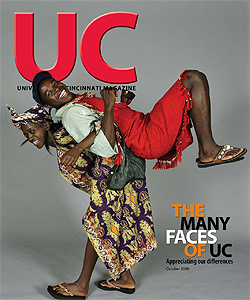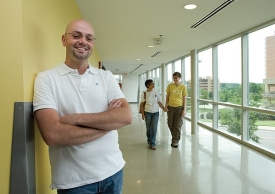UC alumnus Billy Hensley assesses campus climate for gay students
by Deborah Rieselman
For Billy Hensley, going to college meant coming to terms with a terrifying truth he had tried to ignore. It was a time for realizing that God was not going to answer his prayer -- no matter how often or how hard he begged.
Prayer was nothing new to Hensley, EdD '09, who had grown up in a Pentecostal church in the Appalachian Mountains of Kentucky and who was in the ordination process to become a minister. Unfortunately, that upbringing conflicted with something else that was familiar to Hensley.
"In high school, I knew deep down that I was attracted to men," he says. "That was clear. I prayed and asked God all the time to not make me that way.
"Everything in my whole life was built upon the church -- working hard there every time the doors were open and being this idealistic future minister who everyone liked. My whole identity was wrapped up in that. I knew that coming out of the closet would tear that all down."
Gay and lesbian individuals frequently "come out" during their college years, research shows, and although Hensley did not accept reality easily, he started telling a few friends by his fourth year at a rural Kentucky college.
It was a relief. "I didn't have to censor myself anymore," he says. "My mannerisms could be my mannerisms, and people still liked me. No one picked on me or made fun of me like in high school."
Even though Hensley had come to terms with his sexuality and embraced the support of his family by the time he came to UC as a grad student, freshmen often find themselves in a much different place, he explains. Many students arrive at college trying to perpetuate the image of the closeted person they developed at home. "Then all of a sudden, they have people in their life saying, 'It's OK to be something different.'
"That's liberating, but it is also scary," he adds. "You're losing one identity and starting over with another one.
"There are very few places where you can have both of those identities at the same time. For some, college is that place."
One of the reasons colleges are fertile ground for self-awareness, Hensley says, is that "asking questions is the very nature of what we're doing here." Such a quest for knowledge is what attracted Hensley to the Univerity of Cincinnati in 2006 to work on a PhD in Educational Studies.
He wanted to research how gay and lesbian students perceived UC's campus climate and how that impacted their choice of college. His motivation came from an incident that occurred months before he enrolled.
A sophomore theater-arts major with a 4.0 GPA had been expelled from a rural Kentucky Baptist college after a MySpace page revealed a gay lifestyle. The school prohibited homosexuality at the time, but not when the student had enrolled.
Hensley wondered how students end up at colleges so incompatible with their personalities. So he tried to find out, using a focus group, surveys and personal interviews to work on his dissertation, "Seeking Safe Spaces: The Impact of Campus Climate on College Choice."
As frequently happens, answers were not simple. Some students were completely open about their sexual orientation and claimed that UC had helped facilitate that. Others were "juggling the in-the-closet self and the out-of-the-closet self," as Hensley describes, being "open" only with selected friends.
The first in-depth interview he conducted surprised him when the student said, "Why would I chose a college campus for its ability to let you be 'out' when all I ever learned to do is to hide?"
"Then it became clear to me," Hensley says, "that some students have chosen a place where it is safe to hide, where they are not going to be challenged to come out of the closet."
UC, he discovered, is a "middle-of-the road" institution, where students feel safe to be themselves, to explore their authentic selves or to remain hidden. While students are not going to be expelled for lifestyle issues, they are not going to be shamed into coming out, either, if they are not ready.
Furthermore, those who want to find gay connections can easily do so among five different campus groups or on the sixth floor of the Steger Student Life Center where the Women's Center houses a designated space to support students who identify as lesbian, gay, bisexual, transgender or questioning (LGBTQ). And those who simply want to explore the issue further can find a quiet library of relevant material at the center or talk to Tamika Odum, manager responsible for LGBTQ programming.
The Women's Center may seem to be an odd location to find such allies, but the center has always focused on the inclusivity of all students. The center's staff estimates the LGBTQ student population at UC to be around 10 percent, based upon national surveys, including Census data.
In 1998, one of the center's earliest projects was implementing annual Safe Zone training for faculty, staff and administrators who wish to communicate their openness and support for LGBTQ students. Last year, Odum conducted four training sessions with 100 participants at the last one.
Such work is vital, says Barb Rinto, Women's Center director. "If we don't pay attention to people who are different and embrace those differences, we lose all kinds of talent. "When people are excluded, we lose great minds, and some of those minds might have solved serious problems, like eradicating poverty or discovering medical cures. Allowing everyone to be engaged is clearly the right thing to do."
The center has been a great LGBTQ ally in helping people understand themselves and each other, Hensley says. In the future, he hopes the center and other colleges can use his dissertation to make subtle changes on campus.
Blatant homophobia is not an issue at UC, but faculty and staff in some colleges are "unclear about the impact language has, how many of us are left out when they're giving examples in the classroom," he says. "It's not intentional; it's just a lack of knowledge.
"When you can't have open conversations, the experience of learning isn't as deep as it could be. Campus climate is not about glossy brochures and having an aesthetically beautiful campus; it's about having a beautiful climate where learning can happen. "This is all about building a better existence for the people who come after us."
Billy Hensley served on the UC Diversity Council and received the Outstanding Graduate Student award from his college. Even more rewarding was the level of respect faculty showed him, he says. "It makes me wish that all students could have that same experience and be that authentic with their faculty members."
Links:
University of Cincinnati Women's Center
UC's LGBTQ Center
UC GenderBloc
Equality UC

 Issue Archive
Issue Archive